直接引语和间接引语的用法及练习题附答案
直接引语和间接引语详解与习题
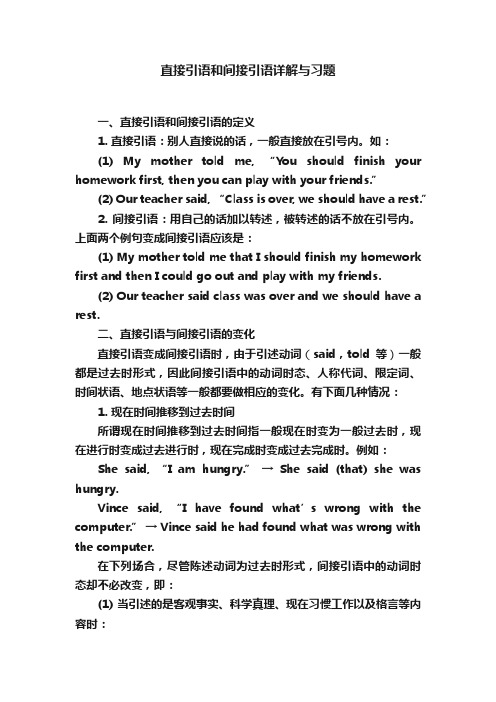
直接引语和间接引语详解与习题一、直接引语和间接引语的定义1. 直接引语:别人直接说的话,一般直接放在引号内。
如:(1) My mother told me, “You should finish your homework first, then you can play with your friends.”(2) Our teacher said, “Class is over, we should have a rest.”2. 间接引语:用自己的话加以转述,被转述的话不放在引号内。
上面两个例句变成间接引语应该是:(1) My mother told me that I should finish my homework first and then I could go out and play with my friends.(2) Our teacher said class was over and we should have a rest.二、直接引语与间接引语的变化直接引语变成间接引语时,由于引述动词(said,told等)一般都是过去时形式,因此间接引语中的动词时态、人称代词、限定词、时间状语、地点状语等一般都要做相应的变化。
有下面几种情况:1. 现在时间推移到过去时间所谓现在时间推移到过去时间指一般现在时变为一般过去时,现在进行时变成过去进行时,现在完成时变成过去完成时。
例如:She said, “I am hungry.” → She said (that) she was hungry.Vince said, “I have found what’s wrong with the computer.” → Vince said he had found what was wrong with the computer.在下列场合,尽管陈述动词为过去时形式,间接引语中的动词时态却不必改变,即:(1) 当引述的是客观事实、科学真理、现在习惯工作以及格言等内容时:He said, “The word ‘laser’ is an acronym(首字母缩略词).” → He said the word ‘laser’ is an acronym.(2) 当动词所表示的状态或动作在引述时仍在继续时:“I’m forty,” he said. → He said he is forty.(3) 当谓语动词包含无过去时形式的情态助动词时:He said, “It must be pretty late. I really must go.” → He said it must be pretty late, and he really must go.He said, “You mustn’t smoke in the room.”→ He said I mustn’t smoke in the room.2. 过去时间推移到过去的过去这里需要注意以下几点:(1) 当强调动作或状态先于引述动词时,一般过去时要变成过去完成体。
直接引语和间接引语用法及练习(含答案)
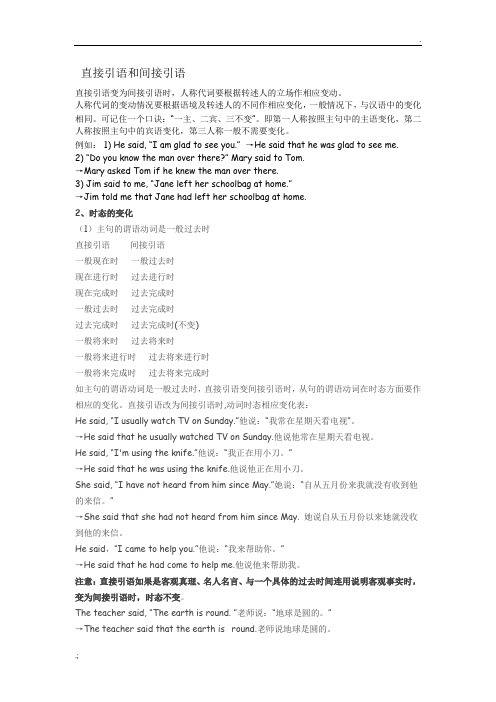
直接引语和间接引语直接引语变为间接引语时,人称代词要根据转述人的立场作相应变动。
人称代词的变动情况要根据语境及转述人的不同作相应变化,一般情况下,与汉语中的变化相同。
可记住一个口诀:“一主、二宾、三不变”。
即第一人称按照主句中的主语变化,第二人称按照主句中的宾语变化,第三人称一般不需要变化。
例如: 1) He said, “I am glad to see you.”→He said that he was glad to see me. 2) “Do you know the man over there?” Mary said to Tom.→Mary asked Tom if he knew the man over there.3) Jim said to me, “Jane left her schoolbag at home.”→Jim told me that Jane had left her schoolbag at home.2、时态的变化(1)主句的谓语动词是一般过去时直接引语间接引语一般现在时一般过去时现在进行时过去进行时现在完成时过去完成时一般过去时过去完成时过去完成时过去完成时(不变)一般将来时过去将来时一般将来进行时过去将来进行时一般将来完成时过去将来完成时如主句的谓语动词是一般过去时,直接引语变间接引语时,从句的谓语动词在时态方面要作相应的变化。
直接引语改为间接引语时,动词时态相应变化表:He said, “I usually watch TV on Sunday.”他说:“我常在星期天看电视”。
→He said that he usually watched TV on Sunday.他说他常在星期天看电视。
He said, “I'm using the knife.”他说:“我正在用小刀。
”→He said that he was using the knife.他说他正在用小刀。
初中语法直接引语转换间接引语讲解附练习题及答案

直接引语与间接引语直接引语:一字不改的引用或复述别人的话,被引用或复述的部分即为直接引语;一般前后用引号,首字母大写;间接引语:用自己的话转述别人的话,被转述的部分即为间接引语;通常以宾语从句的形式出现,不用引号;直接引语变为间接引语时,要注意人称、时态、连接词、语序以及时间状语、地点状语、指示代词及方向性动词的变化;一、人称变化直接引语是第一人称变为间接引语时,一般要变为第三人称;第二人称变为与主句的间接宾语相一致的人称如果没有间接宾语,可根据上下文的体会确定一个人称;第三人称一般不改变;例如 He told me,"I’ll give you a book when I meet you again."—He told me he would give me a book when he met me again.二、时态的变化如果主句是过去式态,变为间接引语时应向前推一个时态;即一般现在时---一般过去式,现在进行时---过去进行时,现在完成时---过去完成时,一般过去时---过去完成时,过去进行时---过去进行时,一般将来时---过去将来时,现在完成进行时---过去完成进行时,过去完成时---过去完成时,过去完成进行时---过去完成进行时;等;例如She wondered:"When will the meeting begin."—She wondered when the meeting would begin.但在以下几种情况下,间接引语的时态不用变化;1、当直接引语表示的是客观真理或经常性的特点时;例如 She said,"The earth goes around the sun".--She said that the earth goes around the sun.2、当直接引语中有绝对具体的过去时间作状语时,保持原来的一般过去时; 例如 He said,"I left home in 1942.—He said he left home in 1942.注:间接引语中的谓语动词有时需要适当的调整;Say后的直接引语表示陈述或命令时可变为ask; say后的直接引语表示请求或询问时可变为ask.例如 The teacher said to me,"I have seen your book.."—The teacher told me that she had seen my book.三、连接词的选择1、陈述句陈述句转化为间接引语时用that引导,也可省略 that;主句谓语动词可用直接引语中的said,也可用told来代替,可以说said that,said to sb. that, told sb. that, 不可以直接说told that.主句中的谓语还常有repeat, answer, reply, explain, announce, declare, think, 等;例如Danny said,"I come from Canada."—Danny said that he came from Canada.2、疑问句直接引语是疑问句变为间接引语时要用陈述语序;主句的动词常用ask,wonder,want to know 等; 1、一般疑问句直接引语为一般疑问句时变为间接引语须用if或whether引导;例如 She asked me,"Is he a teacher "—She asked me if/whether he was a teacher.2}、选择疑问句或反意疑问直接引语是选择疑问句需用or;反意疑问句需用or not变为间接引语时要用whether而不用if.例如 My brother asked me,"Is Tom tall or short "—My brother asked me whether Tom was tall or short."You are reading,aren’t you"he said to me.—He asked me whether I was reading or not.3、特殊疑问句当直接引语为特殊疑问句变为间接引语时,常变成与疑问句同形的连接词引导的宾语从句,用陈述语序,问号变句号;例如"What do you want to eat "he asked me.—He asked me what I wanted to eat. 3、祈使句直接引语是祈使句变为间接引语时,要用不定式表示,使其成为 ask /tell /order sb not to do sth 句型;例如"Don’t open the door."he said to her.—He asked her not to open the door.4、感叹句感叹句变为间接引语时可用 what或how引导,也可用that引导;例如 He said,"What a lovely day it is"—He said what a lovely day it was.—He said that it was a lovely day.四、语序的变化当直接引语是疑问句变为间接引语时要用陈述语序,即连接词+主语+动词的形式;例如"Where are you going "he asked me.—He asked me where I was going.但当直接引语中特殊疑问词作主语时,语序不变;例如He asked, “Who is your brother.” -He asked who was my brother.五、时间状语、地点状语、指示代词及方向性动词的变化;now—then today—that day yesterday—the day before last might—the night before two days ago—two days before next week—the next week tomorrow—the next day the day after tomorrow—in two days’time 或者two days after here—there this—that these—those come—go bring—take 例如 He said,"I did my homework yesterday."—He said he had done his homework the day before.六、情态动词的变化can—could must—had to或者must will—would shall—should may—might一、单项选择:1. He asked ________ for the computer.A. did I pay how muchB. I paid how muchC. how much did I payD. how much I paid2. “Have you seen the film” he asked me. →He asked me ________. A. had I seen the film B. have I seen the film C. if I have seen the film D. whether I had seen the film3. “Please close the window,” he said to me. →He ________ me ________ the window.A. said to; to closeB. told to; closingC. asked; to closeD. said to; please close4. “I am a teacher,” Jack said. →He said ________.A. that I am a teacherB. I was a teacherC. that he is a teacherD. he was a teacher5. He said, “Mother, the boy is very naughty.” →He ________ very naughty.A. said his mother that the boy wasB. said to his mother that the boy isC. told his mother that the boy wasD. spoke to his mother that the boy is6. “You’ve already got well, haven’t you” she asked. →She asked ________or not.A. if I have already got well, hadn’t youB. whether I had already got wellC. have I already got wellD. had I already got well7. He asked, “Are you a Party member or a League member”→He asked me ________.A. am I a Party member or a League memberB. was I a Party member or a League memberC. if I was a Party member or a League memberD. whether was I a Party member or a League member8. He asked, “How are you getting along” →He asked ________.A. how am I getting alongB. how are you getting alongC. how I was getting alongD. how was I getting along 9. He asked me ________ with me.A. what the matter isB. what the matter isC. what’s th e matterD. what was wrong10. He said, “Don’t do that again.” →He ________ me ________ that again.A. said to; not to doB. said to; don’t doC. told; don’t doD. told; not to do二、直接引语转换间接引语1. “I saw a note on my desk.” she said.2. Mother said, “I’ll go to the park tomorrow.”3. He said to me, “Your brother broke it.”4. Tom said, “My sister was here three days ago.”5. “We stayed there for two weeks.” she told me.6. She said, “I have given up smoking.”7. “We’ve known each other for about three years.” the young man told him.8. “I haven’t seen her these days.” he said.9. “Mother gave me a new book as a present yesterday.” Mary said.10. “Do you like English or Chinese” the teacher asked me.11. “What did you do yesterday” she asked me.12. “Would you like an apple” mother asked me.13. “Don’t open the door.” she sai d to me.14. “Come here early tomorrow.” the teacher said to us.15. “Did you go to the cinema last night” she asked.16. “Keep the door closed.” the old man said to us.17. “Did you go there by train or by bus” the teacher asked.18. “They are playing on the playground.” Jim said.三、在横线上填上合适的词1. He exclaimed how lovely the house ___________.2. We didn’t know ___________ she hadn’t handed in the paper.3. The monitor ___________ the five of us to clean the floor yesterday afternoon.4. Anderson told us ___________ his father had just returned from Shanghai.5. She ___________ us to help the old woman in our village that day.6. My father asked me ___________ was the matter when he came back.7. That fellow always ___________ me clean his shoes for him.8. Tom said that he ___________ in the army for three years.9. — What did Alice say just now — She said that ___________ would borrow that dictionaryform Mary.10. I wonder ___________ she can attend my party this evening.四、单项选择1. Right now, the boss ordered John to hand in his design ________.A. this afternoonB. this afternoonC. todayD. that day2. Jimmy ________ her if she had seen him there that afternoon. A. said to B. askedC. toldD. ask3. Uncle Wang ordered us to ________ his house at once. A. come out of B. come C. goout of D. go4. The road is covered with snow. I can’t understand ________ they insist on going by motor-bike.A. whyB. whetherC. whenD. how5. Chen Qiang told Mr. Smith that the People’s Republic of China _______ in October 1,1949.A. foundedB. had been foundedC. foundD. was founded6. She said to me that _______ might keep ________ book for two days.A. she; thisB. I; thatC. I; thisD. you; this7. In order to choose the right one, she first asked me _______ I want to use a dictionary for.A. whatB. whyC. howD. whether8. Customers are asked to make sure that they _______ the right change before leaving the shop.A. will giveB. have been givenC. have givenD. will be given9. Linda shouted that you _______ your homework ahead of her.A. finishedB. would finishC. had finishedD. have finished10. My girlfriend asked me _______ I knew it was her birthday that day or not.A. whetherB. thatC. whyD. what五、巩固练习:1、He asked,"Is the door open or closed."He asked _____ _____ _____ _____ _____ _____ _____.2、She said,"I have left my coat in your room."She said _____ _____ _____ _____ _____ ______ ______ ______.3、She said,"I wrote to my friends yesterday."She said _____ _____ _____ _____ _____ _____ ______ ______ _______ ______.4、Mother asked me,"When will you be back next time."Mother asked me_____ _____ _____ _____ _____ _____ _____ _____.5、The teacher told the students,"The earth is round."The teacher told the students_____ _____ _____ _____ _____ .6、The guard said to Lenin,"Please show me your pass."The guard asked Tom_____ _____ _____ _____ _____ .7、Danny said ,"Are you leaving today or tomorrow, Ling Ming "Danny asked Li Ming_____ _____ _____ _____ _____ _____ _____ ______ ______ ______.8、He said ,"My sister was here two days ago, but she is not here now"He said _____ _____ _____ _____ _____ _____ _____ _____, but_____ was not there then.参考答案:一、单项选择1-5 DDCDC BDCDD二、直接引语转换间接引语参考答案1. She said that she had seen a note on her desk.2. Mother said that she would go to the park the next day.3. He told me that my brother had broken it.4. Tom said that hissister had been there three days before. 5. She told me that they had stayed there for two weeks. 6. She said that she had given up smoking. 7. The young man told him that they had known each other for about three years. 8. He said that he hadn’t seen her those days.9. Mary said that her mother had given her a new book as a present the day before. 10. The teacher asked me whether I liked English or Chinese. 11. She asked me what I had done the day before. 12. Mother asked me if/whether I would like an apple. 13. She asked me not to open the door. 14. The teacher told us to go there early the next day. 15. She asked whether/if I had gone to the cinema the night before. 16. The old man told me us to keep the door closed. 17. The teacher asked whether we had gone there by train or by bus.18. Jim said that they were playing on the playground.三、在横线上填上合适的词1. Was2. why/ that3. asked/ ordered4. that5. advised /asked / ordered6. what7.lets / has / makes8. had been / had served9. she 10.if / whether四、单项选择1-5DBCAD 6-10BABCA五、巩固练习:答案:1. if the door was open or closed 2. she had left her coat in my room3. that she had written to her friends the day before 4 .when I would be back the next time 5. that the earth is round 6 .to show him his pass7 .whether he was leaving that day or the next day 8. his sister had been there two days before ,she .。
直接引语和间接引语及练习题

直接引语和间接引语:引述别人的原话叫直接引语,用自己的话转述别人的话叫间接引语。
这两种引语都是宾语从句,但直接引语放在引号内,不用连词联接;间接引语不用引号,通常用连词连接联接于主句。
A.陈述句直接引语如果是陈述句,变为间接引语时,用连词that引导(that在口语中常省略),从句中的人称、时态、指示代词、时间状语、地点状语等要作相应的变化。
在这一方面,汉语和英语有很多相似之处,因此,在做直接引语和间接引语转换练习时,要特别注意句子的意义。
(1)人称的变化a. He said, “I like it very much.”→He said that he liked it very much.b. He said to me, “I’ve left my book in your room.”→He told me that he had left his book in my room.(2)时态的变化如主句的谓语动词是一般过去时,直接引语变间接引语时,从句的谓语动词在时态方面要作相应的变化。
如主句的谓语动词是现在时,从句的时态则无需变化。
在把直接引语变成间接引语时,谓语动词的时态一般要作相应的变化,但在下列几种情况下时态不变。
①如果间接引语主句中的动词是一般现在时,现在进行时,现在完成时或将来时。
如:He says, “This work is too difficult.”→He says/is saying/has said/will say(that) this work is too difficult.②当直接引语是表示不因说话时间变化而变化的科学真理或客观事实时。
如:He said, “There are over 50,000 different characters in Chinese.”→He said there are over 50,000 different characters in Chinese.③当直接引语动词表示的状态或动作在引述时仍在继续。
直接引语间接引语及练习答案

1. She said, “I will come this morning.”
→→ She said that she would go that morning.
2. He said, “These books are mine.”
→→He said that those books were his.
tomorrow → the next day/the following day the day after tomorrow → in two days` time come → go here → there the day before yesterday → two days before/earlier
He said that those were his.
4. She said “ I saw him last night.”
She said that she had seen him the night before.
5. He said “ Now I live in London.”
He said that he lived in London then.
1. Anne said she didn’t know the address of her new home. 2. Anne said to her father that she had got tired of looking at nature through dirty curtains and dusty windows. 3.The girl said that she need to pack up her things in the suitcase very quickly . 4. Her father asked her why she had chosen her diary and old letters. 5. “Are you very hot with so many clothes on?” Mather asked her .
直接引语和间接引语的用法及练习题
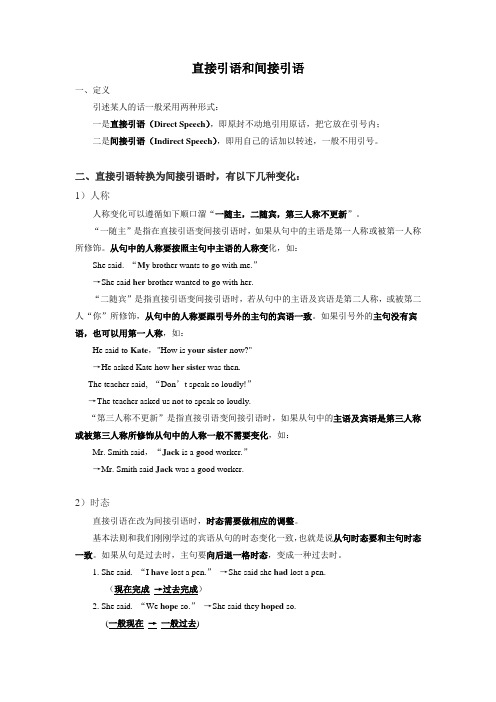
直接引语和间接引语一、定义引述某人的话一般采用两种形式:一是直接引语(Direct Speech),即原封不动地引用原话,把它放在引号内;二是间接引语(Indirect Speech),即用自己的话加以转述,一般不用引号。
二、直接引语转换为间接引语时,有以下几种变化:1)人称人称变化可以遵循如下顺口溜“一随主,二随宾,第三人称不更新”。
“一随主”是指在直接引语变间接引语时,如果从句中的主语是第一人称或被第一人称所修饰。
从句中的人称要按照主句中主语的人称变化,如:She said.“My brother wants to go with me.”→She said her brother wanted to go with her.“二随宾”是指直接引语变间接引语时,若从句中的主语及宾语是第二人称,或被第二人“你”所修饰,从句中的人称要跟引号外的主句的宾语一致。
如果引号外的主句没有宾语,也可以用第一人称,如:He said to Kate,"How is your sister now?"→He asked Kate how her siste r was then.The teacher said, “Don’t speak so loudly!”→The teacher asked us not to speak so loudly.“第三人称不更新”是指直接引语变间接引语时,如果从句中的主语及宾语是第三人称或被第三人称所修饰从句中的人称一般不需要变化,如:Mr. Smith said,“Jack is a good worker.”→Mr. Smith said Jack was a good worker.2)时态直接引语在改为间接引语时,时态需要做相应的调整。
基本法则和我们刚刚学过的宾语从句的时态变化一致,也就是说从句时态要和主句时态一致。
如果从句是过去时,主句要向后退一格时态,变成一种过去时。
直接引语和间接引语及练习及答案
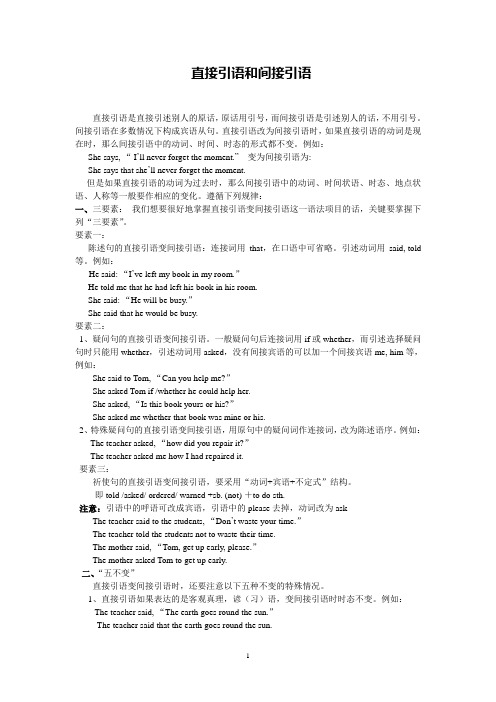
直接引语和间接引语直接引语是直接引述别人的原话,原话用引号,而间接引语是引述别人的话,不用引号。
间接引语在多数情况下构成宾语从句。
直接引语改为间接引语时,如果直接引语的动词是现在时,那么间接引语中的动词、时间、时态的形式都不变。
例如:She says, “ I’ll never forget the moment.”变为间接引语为:She says that she’ll never forget the moment.但是如果直接引语的动词为过去时,那么间接引语中的动词、时间状语、时态、地点状语、人称等一般要作相应的变化。
遵循下列规律:一、三要素:我们想要很好地掌握直接引语变间接引语这一语法项目的话,关键要掌握下列“三要素”。
要素一:陈述句的直接引语变间接引语:连接词用that,在口语中可省略。
引述动词用said, told 等。
例如:He said: “I’ve left my book in my room.”He told me that he had left his book in his room.She said: “He will be busy.”She said that he would be busy.要素二:1、疑问句的直接引语变间接引语。
一般疑问句后连接词用if或whether,而引述选择疑问句时只能用whether,引述动词用asked,没有间接宾语的可以加一个间接宾语me, him等,例如:She said to Tom, “Can you help me?”She asked Tom if /whether he could help her.She asked, “Is this book yours or his?”She asked me whether that book was mine or his.2、特殊疑问句的直接引语变间接引语,用原句中的疑问词作连接词,改为陈述语序。
直接引语与间接引语(带问题详解)
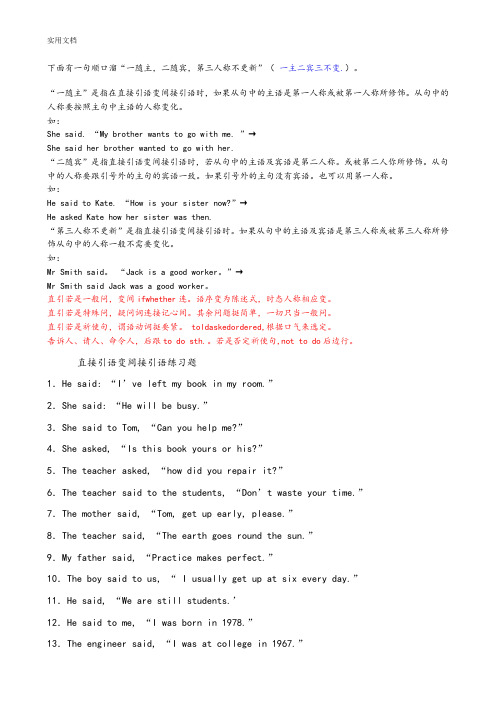
下面有一句顺口溜“一随主,二随宾,第三人称不更新”(一主二宾三不变.)。
“一随主”是指在直接引语变间接引语时,如果从句中的主语是第一人称或被第一人称所修饰。
从句中的人称要按照主句中主语的人称变化。
如:She said. “My brother wants to go with me. ”→She said her brother wanted to go with her.“二随宾”是指直接引语变间接引语时,若从句中的主语及宾语是第二人称。
或被第二人你所修饰。
从句中的人称要跟引号外的主句的宾语一致。
如果引号外的主句没有宾语。
也可以用第一人称。
如:He said to Kate. “How is your sister now?”→He asked Kate how her sister was then.“第三人称不更新”是指直接引语变间接引语时。
如果从句中的主语及宾语是第三人称或被第三人称所修饰从句中的人称一般不需要变化。
如:Mr Smith said。
“Jack is a good worker。
”→Mr Smith said Jack was a good worker。
直引若是一般问,变间ifwhether连。
语序变为陈述式,时态人称相应变。
直引若是特殊问,疑问词连接记心间。
其余问题挺简单,一切只当一般问。
直引若是祈使句,谓语动词挺要紧。
toldaskedordered,根据口气来选定。
告诉人、请人、命令人,后跟to do sth.。
若是否定祈使句,not to do后边行。
直接引语变间接引语练习题1.He said: “I’ve left my book in my room.”2.She said: “He will be busy.”3.She said to Tom, “Can you help me?”4.She asked, “Is this book yours or his?”5.The teacher asked, “how did you repair it?”6.The teacher said to the students, “Don’t waste your time.”7.The mother said, “Tom, get up early, please.”8.The teacher said, “The earth goes round the sun.”9.My father said, “Practice makes perfect.”10.The boy said to us, “ I usually get up at six every day.”11.He said, “We are still students.’12.He said to me, “I was born in 1978.”13.The engineer said, “I was at college in 1967.”14.He said, “I have studied English since I was a boy.”15.She said, “I read the book while I was waiting for a bus.16.Mr. Green said to them, “Joe told me all about his story when he asked for a job.”17.He said, “We insisted that she start immediately.18.She said, “He demanded that the girl leave at once.”19.I said to him, “I have finished it.”20.She said to us,“ I’ll come here tomorrow.”21.“Where does your chemistry teacher live, Karen?” the young man asked.22.“I have gained the first place in the mathematics competition,” the little boy said happily.23.“Light travels faster than sound,” the physics teacher said to the boys and girls.24.“Will you go to the concert with me this evening?” Mary asked me.25.“What did you do here yesterday?” the old man asked my brother.直接引语变间接引语专练题(二)Ⅰ.单项选择1. He asked ________ for the computer.A. did I pay how muchB. I paid how muchC. how much did I payD. how much I paid2. “Have you seen the film?” he asked me. →He asked me _______.A. had I seen the filmB. have I seen the filmC. if I have seen the filmD. whether I had seen the film3. “Please close the window,” he said to me.→He ______ me _____ the window.A. said to; to closeB. told to; closingC. asked ; to closeD. said to; please close4. “I am a teacher,” Jack said. →He said _________.A. that I am a teacherB. I was a teacherC. that he is a teacherD. he was a teacher5. He said, “Mother, the boy is very naughty.”→He _____- very naughty.A. said his mother that the boy wasB. said to his mother that the boy isC. told his mother that the boy wasD. spoke to his mother that the boy was6. “You’ve already got well, haven’t you?” she asked.→She asked ________.A. if I have already got well, hadn’t youB. whether I had already got wellC. have I already got wellD. had I already got well.7. He asked , “ Are you a Party member or a League member?”→He asked me _________.A. am I a Party member or a League memberB. was I a Party member or a League memberC. if I was a Party member or a League memberD. whether was I a Party member or a League member.8. He asked, “How are you getting along?”→He asked _______.A. how am I getting alongB. how are you getting alongC. how I was getting alongD. how was I getting along9. He asked me ________ with me.A. what the matter isB. what the mater wasC. what’s the matterD. what was the matter10. He said, “Don’t do that again.” He _____ me _______ that again.A. said to me; not to doB. said to me; don’t doC. told me; don’t doD. told me; not to do附答案:1. He told me that he had left his book in his room.2. She said that he would be busy.3. She asked Tom if /whether he could help her.4. She asked me whether that book was mine or his.5. The teacher asked me how I had repaired it.6. The teacher told the students not to waste their time.7. The mother asked Tom to get up early.8. The teacher said that the earth goes round the sun.9. My father said practice makes perfect.10. The boy told us he usually gets up at six every day.11. He said they are still students.12. He told me that he was born in 1978.13. The engineer said he was at college in 1967.14. He said he had studied English since he was a boy.15. She said she had read the book while she was waiting for a bus.16. Mr. Green told them Joe had told him all about his story when he asked for a job.17. He said they (had) insisted that she start immediately.18. She said he demanded that the girl leave at once.19. I told him I had finished it.20. She told us she would come here tomorrow21. The young man asked Karen where her chemistry teacher lived.22. The little boy said happily that he had gained the first place in the mathematics competition.23. The physics teacher told the boys and girls that light travels faster than sound.24. Mary asked me if / whether I would go to the concert with her that evening. 25. The old man asked my brother what he had done there the day before.答案与简析:1. D 宾语从句要用陈述句语序。
初中语法-直接引语转换间接引语讲解-附练习题及答案

初中语法-直接引语转换间接引语讲解-附练习题及答案直接引语与间接引语直接引语:一字不改的引用或复述别人的话,被引用或复述的部分即为直接引语。
一般前后用引号,首字母大写。
间接引语:用自己的话转述别人的话,被转述的部分即为间接引语。
通常以宾语从句的形式出现,不用引号。
直接引语变为间接引语时,要注意人称、时态、连接词、语序以及时间状语、地点状语、指示代词及方向性动词的变化。
一、人称变化直接引语是第一人称变为间接引语时,一般要变为第三人称;第二人称变为与主句的间接宾语相一致的人称(如果没有间接宾语,可根据上下文的体会确定一个人称);第三人称一般不改变。
例如He told me,"I’ll give you a book when I meet you again."—He told me he would give me a book when he met me again.二、时态的变化如果主句是过去式态,变为间接引语时应向前推一个时态。
即一般现在时---一般过去式,现在进行时---过去进行时,现在完成时---过去完成时,一般过去时---过去完成时,过去进行时---过去进行时,一般将来时---过去将来时,现在完成进行时---过去完成进行时,过去完成时---过去完成时,过去完成进行时---过去完成进行时。
等。
例如She wondered:"When will the meeting begin."—She wondered when the meeting would begin.但在以下几种情况下,间接引语的时态不用变化。
1、当直接引语表示的是客观真理或经常性的特点时。
例如She said,"The earth goes around the sun".--She said that the earth goes around the sun.2、当直接引语中有绝对具体的过去时间作状语时,保持原来的一般过去时。
高中直接引语和间接引语转化详解(含习题及答案)

直接引语和间接引语转化详解引用别人的话有两种方式,一种是讲述别人的原话,并把它放在引号里,这叫直接引语;另一种是用自己的话来转述别人,并且不能用引号,这就是间接引语。
直接引语和间接引语之间可以互相转换。
扩展1、直接引语如果表示客观真理,变间接引语时,时态不变。
2、直接引语若有明确的表示时间的词语,变间接引语时,时态不变。
3、若直接引语中含有c o u l d,m u s t,s h o u l d等情态动词,变间接引语时,时态不变。
4、直接引述别人的原话,叫直接引语。
5、用自己的话转述别人的话,叫间接引语。
直接引语变间接引语的五点变化1.时态变化直接引语变为间接引语时,若主句为过去时态,变为宾语从句的时态如下表:"l l i k e E n g l i s h v e r y m u c h,"h e s a i d.他说:“我很喜欢英语。
”→H e s a i d t h a t h e l i k e d E n g l i s h v e r y m u c h.H e s a i d,"I t w i l l r a i n s o o n."他说:“很快就会下雨。
”→H e s a i d t h a t i t w o u l d r a i n s o o n.注意:[1]若直接引语为客观真理,则变为间接引语时时态不变:T h e t e a c h e r s a i d t o u s,"K n o w l e d g e i s p o w e r."老师对我们说:“知识就是力量”→T h e t e a c h e r t o l d u s t h a t k n o w l e d g e i s p o w e r.[2]有时由于直接引语有特定的过去时态状语,变为间接引语时时态也可不变:H e s a i d,”M y d a u g h t e r w a s b o r n i n1997."他说:“我的女儿是1997年出生的。
直接引语和间接引语的用法及练习题(附答案)

直接引语和间接引语的用法引述别人的话有两种方式:一是使用引号引出人家的原话,这叫做直接引语;一是用自己的话把人家的话转述出来,这叫做间接引语。
例如:John said, "I'm going to London with my father."约翰说:"我要和父亲到伦敦去。
"(引号内是直接引语)John said that he was going to London with his father.约翰说,他要和他父亲去伦敦。
(宾语从句是间接引语)由直接引语变为间接引语,分以下情况:1.直接引语是陈述句时间接引语为that引导的宾语从句(口语中that可以省略),主句的引述动词主要有say ,tell, repeat, explain, think等。
He said , "You are younger than I."-'He said (that ) I was younger than him.2.直接引语是疑问句时间接引语为陈述语序:主句的谓语动词say 改为ask,或改为wonder, do not know, want to know, be not sure, be puzzled等。
(1)一般疑问句或反意疑问句变为if (whether)引导的宾语从句。
She said, "Do you often come here to read newspapers?"→She asked me if (或whether)I often went there to read newspapers.She asked me , "You have seen the film, haven't you?"→She asked me whether(或if )I had seen the film.(2)选择疑问句变为whether….or 宾语从句。
初中英语语法:直接引语变间接引语详解附练习及答案

直接引语和间接引语Direct speech and Indirect speech1.什么是直接引语?----直接引述别人的原话,一般加冒号,且没有时态呼应的问题;如:He said, “I’m afraid I can’t finish the work.”2.什么是间接引语?-----用自己的话转述别人的话,不用引号,通常情况构成宾语从句,从句中的语序,时态,人称,时间状语,地点状语,和指示代词等都有变化。
如:He said that he was afraid he couldn’t finish the work.3. 为什么要把直接引语变成间接引语?----当你需要转述别人的话的时候就需要用到;除了用say,还可以用tell, ask等。
4.所转述的内容可以是陈述句,疑问句,特殊疑问句,祈使句,感叹句,这几种情况下该怎么将直接引语变成间接引语呢?只要记住刚刚说的那6点:语序,时态,人称,时间状语,地点状语,和指示代词,记住相对应的变化规则,那么就不是一件难事。
下面我们来看例子:直接引语:He said, “My dad will be back tomorrow morning”间接引语:He said that his dad would be back the next/following morning..我们来分析一下这个例句,时态,人称,时间状语都发生了变化My dad---his dad, will be back---would be back, tomorrow morning---the next/following morning一、下面我们先看时态不变的5种情况:1)直接引语是客观真理,自然现象,名言,俗语,或者与一个具体的过去时间连用说明客观事实时,不管主句的谓语动词是什么时态,变为间接引语的时候时态均不变,如:Eg.1---“The earth moves around the sun,” the teacher told us.The teacher told us the earth moves around the sun.Eg.2---He said, “I was born in Guangdong in 1990”.He said he was born in Guangdong in 1990.Eg.3---Goethe said, “The important thing in life is to have a great aim, and the determination to attain it.”Goethe said the important thing in life is to have a great aim, and the determination to attain it.Eg.4:He said, “Practice makes perfect.”He said that practice makes perfect.2)主句的谓语动词是现在是或将来时,变成间接引语时时态不变Eg.1---He says, “I finished the work.”He says he finished the work.Eg.2---He will say, “I have watered the flower.”He will say he has watered the flower.Eg.3---He will say, “I will try my best to help you.”He will say he will try his best to help me.3)直接引语如果是一般现在时,表示反复出现或习惯性动作,变为间接引语时时态不变。
初中英语直接引语和间接引语(含练习题和答案)

直接引语和间接引语Direct Speech and Indirect Speech直接引述别人的原话,叫直接引语。
用自己的话转述别人的话,叫间接引语。
间接引语在多数情况下构成宾语从句。
直接引语一般前后要加引号;间接引语不用引号。
例如:直接引语:Mr. Black said, “I’m busy.”间接引语:Mr. Black said that he was busy.1.陈述句直接引语如果是陈述句,变为间接引语时,用连词that引导(that在口语中常省略),从句中的人称、时态、指示代词、时间状语、地点状语等要作相应的变化。
(1)人称的变化• He said, “I like it very much.”→ He said that he liked it very much.• He said, “I’ve left my book in your room.”→ He told me that he had left his book in my room.(2)时态的变化如主句的谓语动词是一般过去时,直接引语变间接引语时,从句的谓语动词在时态方面要作以下的变化:• He said, “I saw the film yesterday.”→ He said that he had seen the film the day• She said, “I have seen the film. It is good. ”→ She said that she had seen the film.直接引语如果是客观真理,变为间接引语时,时态不变。
例如:• He said, “Light travels much faster than sound.”→ He said that light travels much faster than sound.(3)指示代词、时间状语和地点状语的变化• She said, “I will come this evening.”→ She said that she would go that evening.• He said, “My sister was here three days ago, but she is not here now.”→ He said that his sister had been there three days before but she was not here then.现将这几种变化列表如下:以上这些变化,要根据说话的实际情况来定。
直接引语和间接引语讲解和练习(答案)

直接引语和间接引语直接引述别人的原话,叫做直接引语;用自己话转述别人的话,叫做间接引语。
间接引语一般构成宾语从句。
直接引语必须放在引号内,间接引语则不用引号。
直接引语改为间接引语时,除将引语部分变成宾语从句外,还必须对直接引语中的人称、时态、指示代词、时间状语、地点状语等进行改变。
直接引语转成间接引语的时态变化:1、当主句谓语动词是一般现在时态或一般将来时态宾语从句的谓语动词的时态不作任何变化。
如:He said, ”We help each other. ” = He said that they help each other.She said, ” I have bought a dictionary. ” = She said that she had bought a dictionar y.She said, ” He will go to the hospital. ” = She said that he would go to the hospital.注意:主句谓语动词是一般过去时态动词表示客观真理仍用一般现在时态,不必变为过去时态。
如:The teacher said, “Light travels much faster than sound.”= The teacher said light travels much faster than sound.2.在人称方面存在人称的变化,变化规律常常是:(1)直接引语中的第一人称常跟主句的主语一致。
e.g.He said,“I have finished my homework.”→He said(that)he had finished his homework.(2)直接引语中的第二人称常常依主句中位于动词后面的谈话对象而定,若后面没有谈话对象,则常变为第一人称。
e.g.Tom said,“You must finish your homework today.”→Tom said I had to finish my homework that day.(3)直接引语中的第三人称变为间接引语时, 常不变。
直接引语与间接引语相互转换的方法指导及练习题

直接引语(直述句)与间接引语(转述句)互换定义:1、直接引语:直接引用别人的话。
如:妈妈说:“我今天加班。
”2、间接引语:用自己的话来转述别人话,不能用引号。
如:妈妈说,她今天加班。
直接引语(直述句)改为间接引语(转述句)的方法:1、“你”变“我”,“我”变“她/他”,冒号(:)变逗号(逗号),去掉双引号(“”),句尾用句号,只改双引号里面的。
/2、2、引语是疑问句的,要变成陈述的语气。
如:明明问我:“今天放学后,到我家写作业,行吗?”改为:明明问我,今天放学后,到他家写作业,行不行。
3、有称呼语的,称呼语要去掉如:老红军说:“小鬼,你骑上我的马吧!”改为:老红军说,让我骑上他的马。
间接引语(转述句)改为直接引语(直述句)的方法:反过来即可。
练习题一:把直接引语变成间接引语。
1.老师对我说:“我教你毛笔字的写法。
”2.梅花兴奋地说:“我是中国人,我怎么能忘掉祖国的语言呢?”3.他站起来对大家说:“孩子们,我要去开会了。
你们要听话。
”4.奶奶问我:“今天我还给你送饭吗?”5.妈妈说:“小明,今晚我加班,你自己做饭吃!”6.诸葛亮对鲁肃说:“你借给我二十条船,我自有妙用。
”7.小红军对陈赓说:“将军,我还要等我的同伴呢!”8.妈妈气喘吁吁地说:“我今晚有急事,你去姥姥家。
”9.江姐回答说:“上级的姓名地址,我知道,下级的姓名地址,我也知道。
”10.小明和小红在一起写作业,小明对小红说:“你能教我怎样写作文吗?”12.妈妈对小红说:“你这么小,一个人出门我不放心?”13.鲁肃对诸葛亮说:“都是你自己找的,我怎么帮得了你的忙?”14.“周瑜长叹一声,说:“诸葛亮神机妙算,我真比不上他!”15.刘明问小华:"你什么时候还我那本《故事会》?”16.老班长说:“我快不行了。
小梁,你要坚强些,带领两个小战士走出草地。
”17.李勤沮丧地对我说:"我的钢笔丢了,你能借我一支吗?”18.他凑到我耳边轻轻地问:“记者,你见过电灯吗?”19. 小红军对陈赓说:“我还要等我的同伴呢。
直接引语和间接引语的用法及练习题(附答案)

直接引语和间接引语的用法引述别人的话有两种方式:一是使用引号引出人家的原话,这叫做直接引语;二是用自己的话把人家的话转述出来,被转述的话不放在引号内,这叫做间接引语。
例如:John said, "I'm going to London with my father."约翰说:"我要和父亲到伦敦去。
"(引号内是直接引语)John said that he was going to London with his father.约翰说,他要和他父亲去伦敦。
(宾语从句是间接引语)间接引语在大多数情况下是一个宾语从句,直接引语变成间接引语时,要注意以下几点:人称、时态、指示代词、时间状语、地点状语、动词、句式的变化以及宾语从句要用陈述句语序。
一、如何变句型:1.直接引语是陈述句时,间接引语改为that引导的宾语从句(口语中that可以省略),主句的引述动词主要有say ,tell, repeat, explain, think等。
He said , "You are younger than I."-'He said (that ) I was younger than him.2. 直接引语是疑问句时,间接引语为陈述语序:主句的谓语动词say 改为ask,或改为wonder, do not know, want to know, be not sure, be puzzled等。
(1)直接引语是一般疑问句或反意疑问句时,间接引语变为if (whether)引导的宾语从句。
She said, "Do you often come here to read newspapers?"→She asked me if (或whether)I often went there to read newspapers.She asked me , "You have seen the film, haven't you?" →She asked me whether(或if )I had seen the film. 注意:大多数情况下,if 和whether 可以互换,但后有or not,或在动词不定式前,或放在介词后作连接词时,一般只用whether。
八年级英语直接引语与间接引语练习 有答案

直接引语与间接引语一、学习目标• 1. 掌握直接引语与间接引语的意义、功能及用法;• 2. 进一步熟练过去时态(一般过去时、过去进行时)。
二、学习重点难点• 1.直接引语(Direct Speech)是指原封不动的引用原话,把它放在引号内,例如:•Mother told me, “You should finish your homework first, then you can go out and play with your friends.”•They said, “We want to have a rest.”•间接引语(Reported Speech,又叫Indirect Speech)即用自己的话加以转述,被转述的话不放在引号内。
上面两个例句变成间接引语应该是:•Mother told me that I should finish my homework first and then I could go out and play with my friends.•They said they wanted to have a rest.• 2. 当我们把直接引语变成间接引语时,由于引述动词(said,told等)一般都是过去时形式,因此间接引语中的动词时态、人称代词、限定词、时间状语、地点状语等一般都要做相应的变化。
有下面几种情况:•1)现在时间推移到过去时间•所谓现在时间推移到过去时间指一般现在时变为一般过去时,现在进行时变成过去进行时,现在完成时变成过去完成时。
例如:•She said, “I am hungry.”•-> She said (that) she was hungry.•He said, “The family are fighting among themselves.”•-> He said (that) the family were fighting among themselves.•Tom said, “I have found what‟s wrong with the computer.”•-> Tom said he had found what was wrong with the computer.•在下列场合,尽管陈述动词为过去时形式,间接引语中的动词时态却不必改变,即:•a)当引述的是客观事实、科学真理、现在习惯工作以及格言等内容时:•He said, “The word …laser‟ is an acronym(首字母缩略词).”•-> He said the word ‘laser’is an acronym.•b)当动词所表示的状态或动作在引述时仍在继续时:•“I‟m forty,” he said.•-> He said he is forty.•c)当谓语动词包含无过去时形式的情态助动词时:•He said, “It must be pretty late. I really must go.”•-> He said it must be pretty late, and he really must go.•He said, “You mustn’t smoke in the room.”•-> He said I mustn‟t smoke in the room.•2)过去时间推移到过去的过去•这里需要注意以下几点:•a)当强调动作或状态先于引述动词时,一般过去时要变成过去完成体。
完整版)直接引语和间接引语练习题(附答案)

完整版)直接引语和间接引语练习题(附答案)1."Could you tell me where the post office is?" asked the person。
"Yes。
it's next to the supermarket," replied the other.2.My brother said he was watching TV at that moment.3."Do you know how far it is to the nearest hospital from here?" asked the person。
"It's about ten minutes' walk," replied the other.4."Do you know how much she paid for the new computer yesterday?" asked the person。
"Sorry。
I have no idea," replied the other.5."When will Jenny come back from her holiday?" wondered the person.6."Would you please tell me where you bought this book?" asked the person.1.My sister told me that she was leaving for London the following week.2.John said that Mr。
Smith had arrived.3.She asked if I wanted her to help me.4.She asked if the man in the shop had found his wallet.5.Mum asked the er if they could speak English.6.He asked the boy how many people were in their family.7.He told me that he had left his book in my room.8.Kitty said that she would call again after supper that evening。
初中英语语法:直接引语变间接引语详解附练习及答案

直接引语和间接引语Direct speech and Indirect speech1.什么是直接引语?----直接引述别人的原话,一般加冒号,且没有时态呼应的问题;如:He said, “I’m afraid I can’t finish the work.”2.什么是间接引语?-----用自己的话转述别人的话,不用引号,通常情况构成宾语从句,从句中的语序,时态,人称,时间状语,地点状语,和指示代词等都有变化。
如:He said that he was afraid he couldn’t finish the work.3. 为什么要把直接引语变成间接引语?----当你需要转述别人的话的时候就需要用到;除了用say,还可以用tell, ask等。
4.所转述的内容可以是陈述句,疑问句,特殊疑问句,祈使句,感叹句,这几种情况下该怎么将直接引语变成间接引语呢?只要记住刚刚说的那6点:语序,时态,人称,时间状语,地点状语,和指示代词,记住相对应的变化规则,那么就不是一件难事。
下面我们来看例子:直接引语:He said, “My dad will be back tomorrow morning”间接引语:He said that his dad would be back the next/following morning..我们来分析一下这个例句,时态,人称,时间状语都发生了变化My dad---his dad, will be back---would be back, tomorrow morning---the next/following morning一、下面我们先看时态不变的5种情况:1)直接引语是客观真理,自然现象,名言,俗语,或者与一个具体的过去时间连用说明客观事实时,不管主句的谓语动词是什么时态,变为间接引语的时候时态均不变,如:Eg.1---“The earth moves around the sun,” the teacher told us.The teacher told us the earth moves around the sun.Eg.2---He said, “I was born in Guangdong in 1990”.He said he was born in Guangdong in 1990.Eg.3---Goethe said, “The important thing in life is to have a great aim, and the determination to attain it.”Goethe said the important thing in life is to have a great aim, and the determination to attain it.Eg.4:He said, “Practice makes perfect.”He said that practice makes perfect.2)主句的谓语动词是现在是或将来时,变成间接引语时时态不变Eg.1---He says, “I finished the work.”He says he finished the work.Eg.2---He will say, “I have watered the flower.”He will say he has watered the flower.Eg.3---He will say, “I will try my best to help you.”He will say he will try his best to help me.3)直接引语如果是一般现在时,表示反复出现或习惯性动作,变为间接引语时时态不变。
- 1、下载文档前请自行甄别文档内容的完整性,平台不提供额外的编辑、内容补充、找答案等附加服务。
- 2、"仅部分预览"的文档,不可在线预览部分如存在完整性等问题,可反馈申请退款(可完整预览的文档不适用该条件!)。
- 3、如文档侵犯您的权益,请联系客服反馈,我们会尽快为您处理(人工客服工作时间:9:00-18:30)。
"Shall we listen to the music?" he asked.
→He suggested listening to the music.ห้องสมุดไป่ตู้
4.直接引语是感叹句时
间接引语为what或how引导,也可以用that引导。
She said, "What a lovely day it is !"
(2)选择疑问句变为whether….or宾语从句。
I asked him, "Will you stay at home or go to a film tonight?"
→I asked him whether he would stay at home or go to a film that night.
→The teacher said that the earth goes round the sun.
(2)如果直接引语中有明确表示过时间的状语,变为间接引语时,一般过去时不改为过去完成时。如:
He said to me, "I was born in 1973."
→He told me that he was born in 1973.
→She said what a lovely day it was .或She said that it was a lovely day.
5.如果主句谓语动词为各种现在时或一般将来时,则间接引语中的动词仍保持直接引语原来时态。如果主句谓语动词为过去时,间接引语中的动词时态按下列变化:
(1)一般现在时变为一般过去时
(3)特殊疑问句变为由原来的疑问词引导的宾语从句。
He asked , "Where do you live?"
→He asked me where I lived.
3.直接引语是祈使句时
间接引语为不定式,作ask , tell, beg, order, warn, advise等动词的宾语补足语(don't变为not).
→She asked me if (或whether)I often went there to read newspapers.
She asked me , "You have seen the film, haven't you?"
→She asked me whether(或if )I had seen the film.
2.直接引语是疑问句时
间接引语为陈述语序:主句的谓语动词say改为ask,或改为wonder, do not know, want to know, be not sure, be puzzled等。
(1)一般疑问句或反意疑问句变为if (whether)引导的宾语从句。
She said, "Do you often come here to read newspapers?"
The teacher said to the boy, "Open the window."→The teacher told the boy to open the window.
His father said to him , "Don't leave the door open."→His father told him not to leave the door open.
(2) "Would you mind opening the window?" he asked.
→He asked me to open the window.
"Why don't you take a walk after supper?" he asked .
→he advised me to take a walk after supper.
[注意]
(1)有些表示建议、提议、劝告或要求的祈使句,可以用suggest ,insist等动词加以转述。例如:
He said, "Let's go to the theatre."
→He suggested (our )going to the theatre.或He suggested that we(should) go to the theatre.
He said“Iam angry.”
He told me that he was angry.
(2)现在进行时变为过去进行时
(3)一般将来时变为过去将来时
(4)现在完成时变为过去完成时
(5)一般过去时变为过去完成时
Mr. Green said to them,“Joe told me all about his story when he asked for a job.”
直接引语和间接引语的用法
引述别人的话有两种方式:一是使用引号引出人家的原话,这叫做直接引语;一是用自己的话把人家的话转述出来,这叫做间接引语。例如:
John said, "I'm going to London with my father."
约翰说:"我要和父亲到伦敦去。"(引号内是直接引语)
John said that he was going to London with his father.
约翰说,他要和他父亲去伦敦。(宾语从句是间接引语)
由直接引语变为间接引语,分以下情况:
1.直接引语是陈述句时
间接引语为that引导的宾语从句(口语中that可以省略),主句的引述动词主要有say ,tell, repeat, explain, think等。
He said , "You are younger than I."-'He said (that ) I was younger than him.
Mr. Green told them Joe had told him all about his story when he asked for a job.
(6)过去完成时不变,仍为过去完成时
[注意]
(1)如果直接引语是表示客观真理时,变为间接引语,一般现在时不改为一般过去时。如:
The teacher said "The earth goes round the sun."
